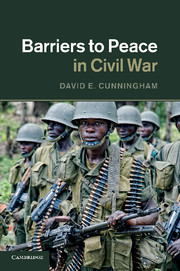Book contents
- Frontmatter
- Contents
- List of figures
- List of tables
- Acknowledgements
- List of acronyms
- 1 Introduction
- 2 A veto player theory of conflict bargaining
- 3 Testing the effect of veto players on duration
- 4 Bargaining and fighting in Rwanda and Burundi
- 5 The effects of veto players on conflict severity, genocide, and the duration of peace
- 6 Designing peace processes in multi-party civil wars
- 7 Conclusion
- Appendix A Civil wars included in the dataset
- Appendix B Descriptive statistics for variables in quantitative analyses
- References
- Index
3 - Testing the effect of veto players on duration
Published online by Cambridge University Press: 05 October 2012
- Frontmatter
- Contents
- List of figures
- List of tables
- Acknowledgements
- List of acronyms
- 1 Introduction
- 2 A veto player theory of conflict bargaining
- 3 Testing the effect of veto players on duration
- 4 Bargaining and fighting in Rwanda and Burundi
- 5 The effects of veto players on conflict severity, genocide, and the duration of peace
- 6 Designing peace processes in multi-party civil wars
- 7 Conclusion
- Appendix A Civil wars included in the dataset
- Appendix B Descriptive statistics for variables in quantitative analyses
- References
- Index
Summary
The presence of a greater number of parties with separate preferences over the outcome of conflict, a cohesive organizational structure, and the military capacity to continue the conflict unilaterally makes bargaining harder and more prone to failure. This, then, should mean that conflicts with more of these actors drag on. Additionally, it should mean that each individual rebel group fights longer when there are more veto players in the conflict. In this chapter, I test these predictions, as well as the hypotheses about the type and strength of veto players derived in the previous chapter, using original data I collected.
The discussion in this chapter proceeds in five parts. First, I discuss the set of civil wars that will be used and the measurements of veto players I created. I then use these measurements to examine trends in the number of veto players across conflicts over the last sixty years. Second, I conduct a series of statistical tests to analyze the effect of veto players on duration. These tests show that civil wars with more veto players are substantially longer. They also provide some support for the predictions that conflicts are longer when they include veto players with more extreme preferences and when they include stronger veto players. Empirical analysis also suggests that individual veto players fight longer wars when there are other veto players in the conflict.
- Type
- Chapter
- Information
- Barriers to Peace in Civil War , pp. 63 - 131Publisher: Cambridge University PressPrint publication year: 2011



